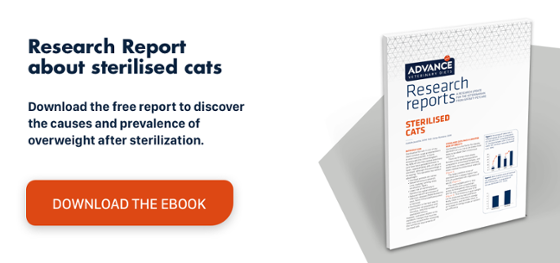The role of diet in feline lower urinary tract disease (FLUTD)
Urolithiasis is one of the diseases affecting this area, struvite and calcium oxalate stones being the most common. They can produce various clinical signs (haematuria, dysuria, stranguria and periuria) or develop asymptomatically. Uroliths are mainly found in the bladder and urethra. The incidence of urolithiasis in cats is estimated to be between 15 and 23%.1
The risk factors for urolithiasis can be divided into three groups:1
- Aetiological: Toxic, teratogenic or infectious agents.
- Demographic: Species, breed, gender, genetic predisposition.
- Environmental: Living conditions, sources of food and water, socioeconomic factors.
Most of the urea (a urolith precursor) in urine comes from protein absorbed in the diet. In addition, a high-protein diet is also high in phosphates, which is another risk factor for urinary tract problems.2
Advance has developed Advance Veterinary Diets Urinary, a range of complete and balanced diets for adult cats with a tendency to form urinary tract stones.The low phosphorus content in Advance Veterinary Diets Urinary contributes to normal urinary tract function, and low protein and magnesium levels mean that struvite stones are less likely to form.
Thanks to its special formulation with a moderate pH level, low magnesium content and urine acidifying properties (corn protein, phosphoric acid and methionine), Advance Veterinary Diets Urinary is indicated to reduce the recurrence of struvite stones. The optimum sodium and potassium concentration helps increase urine output and dissolve any uroliths. Glucosamine and chondroitin help restore the mucosa of the urinary tract, which is damaged during stone formation. Furthermore, cats find it delicious, so it is a viable long-term solution to prevent stone recurrence in cats prone to urinary problems.
Diet plays a key role in the treatment of urolithiasis. The vet should also encourage increased water intake and more dilute urine. The management of some uroliths, such as struvite stones, is based on a specific dietary profile that controls the levels of precursors in the diet and urine pH; struvite crystals dissolve when urine pH is less than 6.3 and will form at a pH above 7.2.
The aim of dietary changes in animals with struvite stones is to increase urine output and reduce the concentration of urea, phosphorus and magnesium.2 Some cases suffer a lot of relapses, so prevention becomes important to lower the reliance on treatments or surgery and the strategy revolves around minimising the risk factors for stone formation, which usually includes dietary changes.4
The Advance URINARY range has three unique formulas for specific clinical pictures: ADVANCE Veterinary Diets URINARY, URINARY STRESS and URINARY LOW CALORIE.

